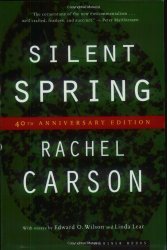Toxics
How Endocrine Disruptors Disrupt Our Endocrine Systems
 Toxicologist Steven G. Gilbert, PhD, DABT, a regular guest who is helping us understand the toxicity of common chemicals we may be frequently exposed to. Dr. Gilbert is Director and Founder of the Institute of Neurotoxicology and author of A Small Dose of Toxicology- The Health Effects of Common Chemicals.
Toxicologist Steven G. Gilbert, PhD, DABT, a regular guest who is helping us understand the toxicity of common chemicals we may be frequently exposed to. Dr. Gilbert is Director and Founder of the Institute of Neurotoxicology and author of A Small Dose of Toxicology- The Health Effects of Common Chemicals.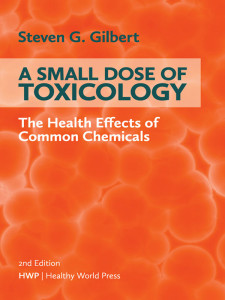 He received his Ph.D. in Toxicology in 1986 from the University of Rochester, Rochester, NY, is a Diplomat of American Board of Toxicology, and an Affiliate Professor in the Department of Environmental and Occupational Health Sciences, University of Washington. His research has focused on neurobehavioral effects of low-level exposure to lead and mercury on the developing nervous system. Dr. Gilbert has an extensive website about toxicology called Toxipedia, which includes a suite of sites that put scientific information in the context of history, society, and culture. www.toxipedia.org
He received his Ph.D. in Toxicology in 1986 from the University of Rochester, Rochester, NY, is a Diplomat of American Board of Toxicology, and an Affiliate Professor in the Department of Environmental and Occupational Health Sciences, University of Washington. His research has focused on neurobehavioral effects of low-level exposure to lead and mercury on the developing nervous system. Dr. Gilbert has an extensive website about toxicology called Toxipedia, which includes a suite of sites that put scientific information in the context of history, society, and culture. www.toxipedia.org
New Movie on Toxics: Unacceptable Levels
 My guest today is filmmaker Ed Brown, who created the new film “Unacceptable Levels.” The film examines the results of the chemical revolution of the 1940s through the eyes of Ed, a father seeking to understand the world in which he and his wife are raising their children. This documentary was made by one man and his camera traveling extensively to find and interview top minds in the fields of science, advocacy, and law. Weaving their testimonies into a compelling narrative, Brown presents us with the story of how the chemical revolution brought us to where we are, and of where, if we’re not vigilant, it may take us. We’ll be talking about what Ed learned by making this film, how it changed his viewpoint about toxic chemicals, and what changes he’s made in his life to reduce exposure to toxic chemicals. www.unacceptablelevels.com
My guest today is filmmaker Ed Brown, who created the new film “Unacceptable Levels.” The film examines the results of the chemical revolution of the 1940s through the eyes of Ed, a father seeking to understand the world in which he and his wife are raising their children. This documentary was made by one man and his camera traveling extensively to find and interview top minds in the fields of science, advocacy, and law. Weaving their testimonies into a compelling narrative, Brown presents us with the story of how the chemical revolution brought us to where we are, and of where, if we’re not vigilant, it may take us. We’ll be talking about what Ed learned by making this film, how it changed his viewpoint about toxic chemicals, and what changes he’s made in his life to reduce exposure to toxic chemicals. www.unacceptablelevels.com
Can Dry Cleaning be Less Toxic?
 My guest today is Joy Onasch, who oversees the community and small business program at the Toxics Use Reduction Institute at the University of Massachusetts Lowell. She manages the community grants which are awarded each year to community-based or municipal organizations striving to reduce or eliminate toxics. Focus areas of the community and small business program currently include reducing or eliminating toxics in the home (including cleaning and building materials), pesticides, the cosmetology industry, auto shops, and perchloroethylene in dry cleaning. Today we will be talking specifically about dry cleaning, how dry cleaning establishments can become less toxic and how you can choose a less toxic dry cleaner. Joy is an engineer with over fifteen years of experience with industry, government, and institutions, assisting them with environmental compliance issues and pollution prevention projects. Her technical focus areas include hazardous waste, stormwater, wastewater, oil storage, and toxics use reduction. Joy earned a bachelor’s degree in Mechanical Engineering from Union College and a Master’s in Engineering and Policy from Washington University in St. Louis. She is a registered Professional Engineer in three states and a registered Toxics Use Reduction Planner in Massachusetts. www.turi.org
My guest today is Joy Onasch, who oversees the community and small business program at the Toxics Use Reduction Institute at the University of Massachusetts Lowell. She manages the community grants which are awarded each year to community-based or municipal organizations striving to reduce or eliminate toxics. Focus areas of the community and small business program currently include reducing or eliminating toxics in the home (including cleaning and building materials), pesticides, the cosmetology industry, auto shops, and perchloroethylene in dry cleaning. Today we will be talking specifically about dry cleaning, how dry cleaning establishments can become less toxic and how you can choose a less toxic dry cleaner. Joy is an engineer with over fifteen years of experience with industry, government, and institutions, assisting them with environmental compliance issues and pollution prevention projects. Her technical focus areas include hazardous waste, stormwater, wastewater, oil storage, and toxics use reduction. Joy earned a bachelor’s degree in Mechanical Engineering from Union College and a Master’s in Engineering and Policy from Washington University in St. Louis. She is a registered Professional Engineer in three states and a registered Toxics Use Reduction Planner in Massachusetts. www.turi.org
Honoring Rachel Carson–The First Author to Write About Toxics–For Earth Day
Silent Spring is a classsic environmental book, but it was also the first popular book to write about the toxic effects of pesticides to human health. Today I have two guests who have studied Carson’s life, to tell us more about her life and works, and how she contributed to our modern awareness of toxics.
Rachel Carson is one of my inspirations and heros, because she stood up for our rights to live in a toxic-free world when nobody else was talking about it. So today I want to honor her.
 Linda Lear PhD is the author of the acclaimed biography of Rachel Carson, Rachel Carson: Witness for Nature, and numerous articles on Carson. Lear’s biography of Carson was awarded the prize for the best book on women in science by the History of Science Society and has been translated into eight languages. www.rachelcarson.org
Linda Lear PhD is the author of the acclaimed biography of Rachel Carson, Rachel Carson: Witness for Nature, and numerous articles on Carson. Lear’s biography of Carson was awarded the prize for the best book on women in science by the History of Science Society and has been translated into eight languages. www.rachelcarson.org
 Patricia DeMarco PhD has been a Rachel Carson scholar since 2005, with service as the Executive Director of the Rachel Carson Homestead Association and as the Director of the Rachel Carson Institute at Chatham University. She writes and speaks extensively on the environmental ethic of Rachel Carson and her relevance to modern times. She is currently writing a book titled “Pathways to Our Sustainable Future.”
Patricia DeMarco PhD has been a Rachel Carson scholar since 2005, with service as the Executive Director of the Rachel Carson Homestead Association and as the Director of the Rachel Carson Institute at Chatham University. She writes and speaks extensively on the environmental ethic of Rachel Carson and her relevance to modern times. She is currently writing a book titled “Pathways to Our Sustainable Future.”
The Dangers of Exposure to Radiation and How to Protect Yourself
 Toxicologist Steven G. Gilbert, PhD, DABT, a regular guest who is helping us understand the toxicity of common chemicals we may be frequently exposed to. Dr. Gilbert is Director and Founder of the Institute of Neurotoxicology and author of A Small Dose of Toxicology- The Health Effects of Common Chemicals.
Toxicologist Steven G. Gilbert, PhD, DABT, a regular guest who is helping us understand the toxicity of common chemicals we may be frequently exposed to. Dr. Gilbert is Director and Founder of the Institute of Neurotoxicology and author of A Small Dose of Toxicology- The Health Effects of Common Chemicals. He received his Ph.D. in Toxicology in 1986 from the University of Rochester, Rochester, NY, is a Diplomat of American Board of Toxicology, and an Affiliate Professor in the Department of Environmental and Occupational Health Sciences, University of Washington. His research has focused on neurobehavioral effects of low-level exposure to lead and mercury on the developing nervous system. Dr. Gilbert has an extensive website about toxicology called Toxipedia, which includes a suite of sites that put scientific information in the context of history, society, and culture. www.toxipedia.org
He received his Ph.D. in Toxicology in 1986 from the University of Rochester, Rochester, NY, is a Diplomat of American Board of Toxicology, and an Affiliate Professor in the Department of Environmental and Occupational Health Sciences, University of Washington. His research has focused on neurobehavioral effects of low-level exposure to lead and mercury on the developing nervous system. Dr. Gilbert has an extensive website about toxicology called Toxipedia, which includes a suite of sites that put scientific information in the context of history, society, and culture. www.toxipedia.org
What Major Retailers are Doing (or Not) to Reduce Toxic Chemicals in the Products They Sell
 My guest today is Mike Schade, Mind the Store Campaign Director at Safer Chemicals, Healthy Families. The Mind the Store campaign works with the nation’s leading retailers on creating comprehensive chemicals policy. For the previous eight years, Mike was the Markets Campaign Coordinator with the Center for Health, Environment & Justice (CHEJ), a national environmental health organization where he led national campaigns to phase out PVC plastic, phthalates, BPA and dioxin. Prior to CHEJ, he was the Western New York Director of Citizens’ Environmental Coalition. Ethisphere Magazine listed Mike as one of the 100 Most Influential People in Business Ethics for 2007 and the PVC Campaign received two awards from the Business Ethics Network. www.saferchemicals.org
My guest today is Mike Schade, Mind the Store Campaign Director at Safer Chemicals, Healthy Families. The Mind the Store campaign works with the nation’s leading retailers on creating comprehensive chemicals policy. For the previous eight years, Mike was the Markets Campaign Coordinator with the Center for Health, Environment & Justice (CHEJ), a national environmental health organization where he led national campaigns to phase out PVC plastic, phthalates, BPA and dioxin. Prior to CHEJ, he was the Western New York Director of Citizens’ Environmental Coalition. Ethisphere Magazine listed Mike as one of the 100 Most Influential People in Business Ethics for 2007 and the PVC Campaign received two awards from the Business Ethics Network. www.saferchemicals.org
How Organizations are Reducing Toxic Chemicals to Protect Public Health
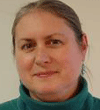 My guest today is Liz Harriman, Deputy Director of the Toxics Use Reduction Institute (TURI) at the University of Massachusetts Lowell. We’ll be talking about what businesses, community organizations and government agencies are doing to reduce the use of toxic chemicals to protect public health and the environment. As Deputy Director of the Toxics Use Reduction Institute, Liz Harriman is responsible for managing the operations and technical functions of the Institute, as well as working with the other TURA agencies to set direction for the program. In her 20+ years working at the Institute, she has provided technical research and support services to Massachusetts companies with the goal of identifying safer alternatives to toxic chemicals used in manufacturing and products. Recent technical work includes prioritization and hazard evaluation of chemicals, chemical alternatives assessment, and flame retardants. Ms. Harriman is a registered Professional Engineer and holds Bachelors and Masters degrees from Cornell University in Civil Engineering and a Master’s degree in Hazardous Materials Management from Tufts University. www.turi.org
My guest today is Liz Harriman, Deputy Director of the Toxics Use Reduction Institute (TURI) at the University of Massachusetts Lowell. We’ll be talking about what businesses, community organizations and government agencies are doing to reduce the use of toxic chemicals to protect public health and the environment. As Deputy Director of the Toxics Use Reduction Institute, Liz Harriman is responsible for managing the operations and technical functions of the Institute, as well as working with the other TURA agencies to set direction for the program. In her 20+ years working at the Institute, she has provided technical research and support services to Massachusetts companies with the goal of identifying safer alternatives to toxic chemicals used in manufacturing and products. Recent technical work includes prioritization and hazard evaluation of chemicals, chemical alternatives assessment, and flame retardants. Ms. Harriman is a registered Professional Engineer and holds Bachelors and Masters degrees from Cornell University in Civil Engineering and a Master’s degree in Hazardous Materials Management from Tufts University. www.turi.org
Toxics Throughout History—Exposure to Toxic Substances is Not New
 Toxicologist Steven G. Gilbert, PhD, DABT, a regular guest who is helping us understand the toxicity of common chemicals we may be frequently exposed to. Dr. Gilbert is Director and Founder of the Institute of Neurotoxicology and author of A Small Dose of Toxicology- The Health Effects of Common Chemicals.
Toxicologist Steven G. Gilbert, PhD, DABT, a regular guest who is helping us understand the toxicity of common chemicals we may be frequently exposed to. Dr. Gilbert is Director and Founder of the Institute of Neurotoxicology and author of A Small Dose of Toxicology- The Health Effects of Common Chemicals. He received his Ph.D. in Toxicology in 1986 from the University of Rochester, Rochester, NY, is a Diplomat of American Board of Toxicology, and an Affiliate Professor in the Department of Environmental and Occupational Health Sciences, University of Washington. His research has focused on neurobehavioral effects of low-level exposure to lead and mercury on the developing nervous system. Dr. Gilbert has an extensive website about toxicology called Toxipedia, which includes a suite of sites that put scientific information in the context of history, society, and culture. www.toxipedia.org
He received his Ph.D. in Toxicology in 1986 from the University of Rochester, Rochester, NY, is a Diplomat of American Board of Toxicology, and an Affiliate Professor in the Department of Environmental and Occupational Health Sciences, University of Washington. His research has focused on neurobehavioral effects of low-level exposure to lead and mercury on the developing nervous system. Dr. Gilbert has an extensive website about toxicology called Toxipedia, which includes a suite of sites that put scientific information in the context of history, society, and culture. www.toxipedia.org
Which Poison Will Change Your Life?
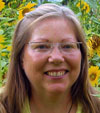 My guest today is Glenna Chance, author of Which Poison Will Change Your Life? While pursuing her career in music in 1988, Glenna was poisoned by an illegal pesticide application. Her life-altering diagnosis of the chronic illness Multiple Chemical Sensitivity catapulted her into a new direction, and she has since battled the physical ramifications and lack of legal parity that often accompany MCS disability. Glenna has worked tirelessly to bring recognition to the illness and support to sufferers. We’ll talk about the the social and political forces that contribute to MCS and many other “invisible” illnesses that are the result of explsure to toxic chemicals in ordinary everyday consumer products. Glenna is a professional musician, environmental consultant and Multiple Chemical Sensitivity advocate and activist.
My guest today is Glenna Chance, author of Which Poison Will Change Your Life? While pursuing her career in music in 1988, Glenna was poisoned by an illegal pesticide application. Her life-altering diagnosis of the chronic illness Multiple Chemical Sensitivity catapulted her into a new direction, and she has since battled the physical ramifications and lack of legal parity that often accompany MCS disability. Glenna has worked tirelessly to bring recognition to the illness and support to sufferers. We’ll talk about the the social and political forces that contribute to MCS and many other “invisible” illnesses that are the result of explsure to toxic chemicals in ordinary everyday consumer products. Glenna is a professional musician, environmental consultant and Multiple Chemical Sensitivity advocate and activist. 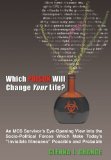 She is the founder and director of MCS Advocacy.com, an agency which advocates for the MCS-disabled and their families who need assistance in finding housing, benefits, nontoxic products and medical and legal resources. She is a proponent of life lived in harmony with the universal truths of nature. MCSAdvocacy.com
She is the founder and director of MCS Advocacy.com, an agency which advocates for the MCS-disabled and their families who need assistance in finding housing, benefits, nontoxic products and medical and legal resources. She is a proponent of life lived in harmony with the universal truths of nature. MCSAdvocacy.com
The Ethics of Toxics
 Toxicologist Steven G. Gilbert, PhD, DABT, a regular guest who is helping us understand the toxicity of common chemicals we may be frequently exposed to. Dr. Gilbert is Director and Founder of the Institute of Neurotoxicology and author of A Small Dose of Toxicology- The Health Effects of Common Chemicals.
Toxicologist Steven G. Gilbert, PhD, DABT, a regular guest who is helping us understand the toxicity of common chemicals we may be frequently exposed to. Dr. Gilbert is Director and Founder of the Institute of Neurotoxicology and author of A Small Dose of Toxicology- The Health Effects of Common Chemicals. He received his Ph.D. in Toxicology in 1986 from the University of Rochester, Rochester, NY, is a Diplomat of American Board of Toxicology, and an Affiliate Professor in the Department of Environmental and Occupational Health Sciences, University of Washington. His research has focused on neurobehavioral effects of low-level exposure to lead and mercury on the developing nervous system. Dr. Gilbert has an extensive website about toxicology called Toxipedia, which includes a suite of sites that put scientific information in the context of history, society, and culture. www.toxipedia.org
He received his Ph.D. in Toxicology in 1986 from the University of Rochester, Rochester, NY, is a Diplomat of American Board of Toxicology, and an Affiliate Professor in the Department of Environmental and Occupational Health Sciences, University of Washington. His research has focused on neurobehavioral effects of low-level exposure to lead and mercury on the developing nervous system. Dr. Gilbert has an extensive website about toxicology called Toxipedia, which includes a suite of sites that put scientific information in the context of history, society, and culture. www.toxipedia.org

